
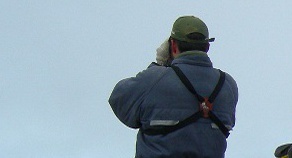
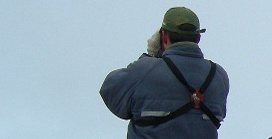
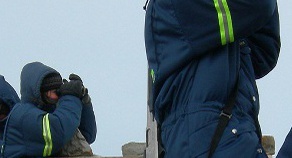
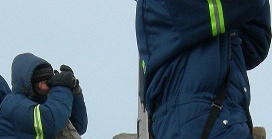

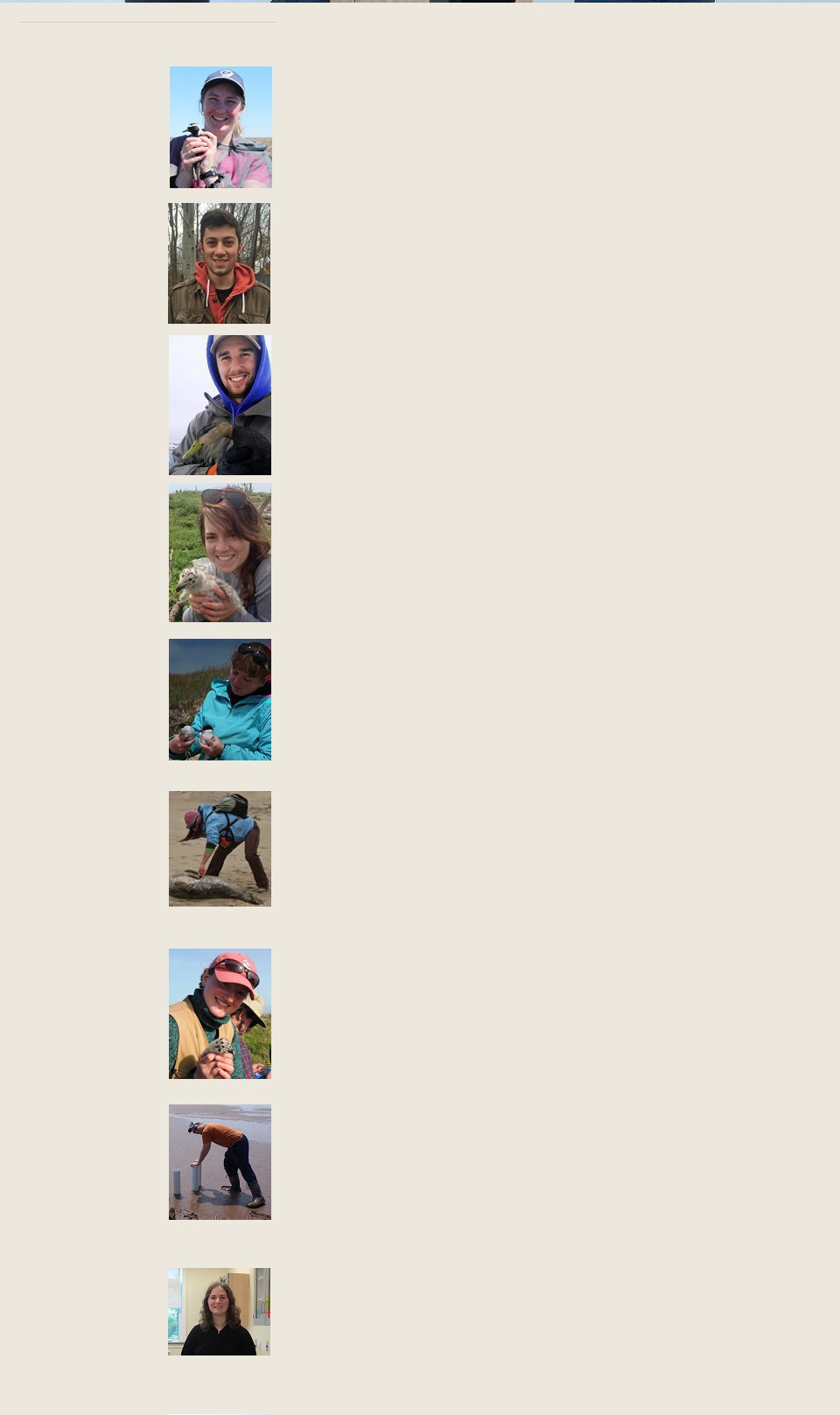




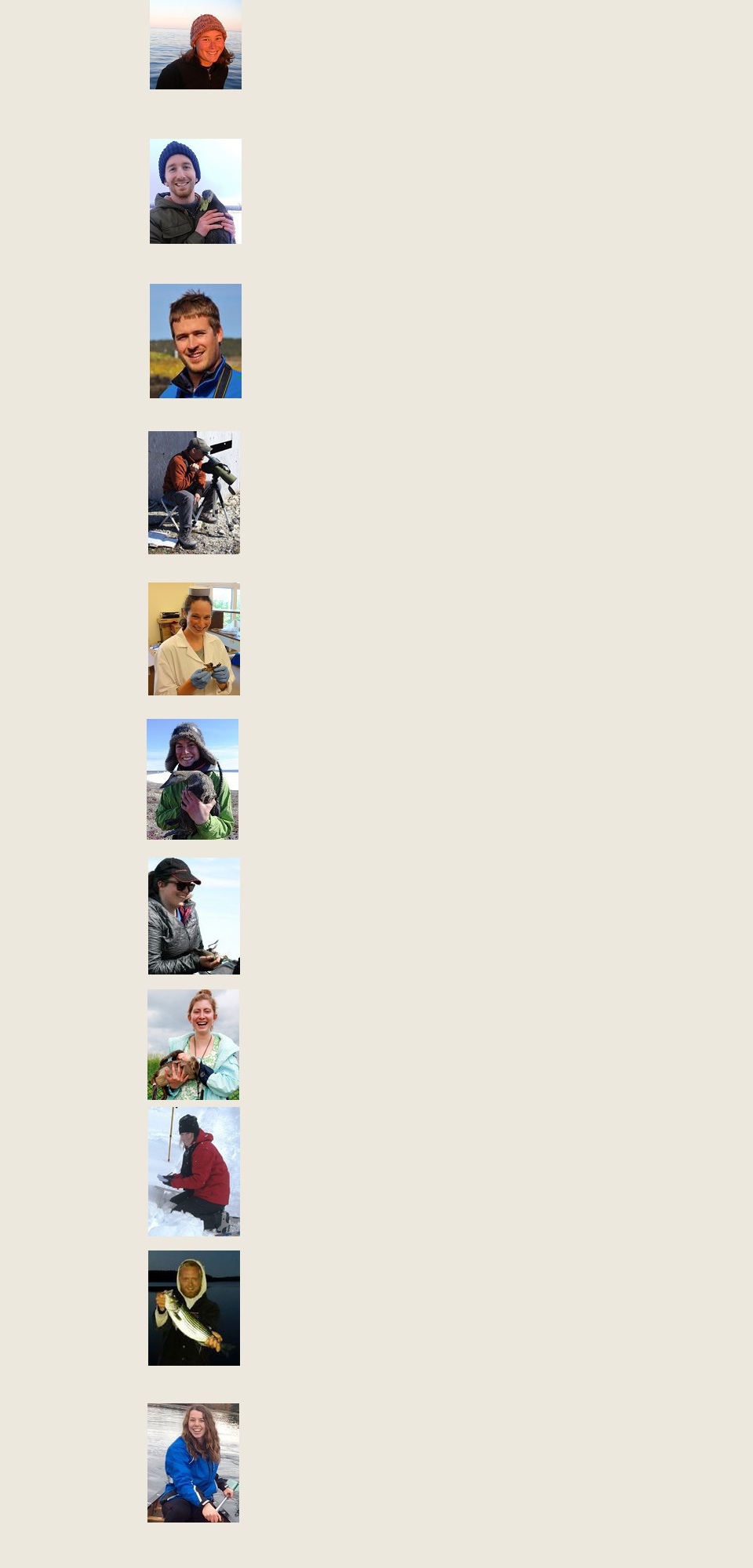
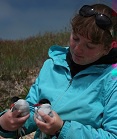
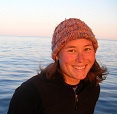
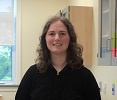
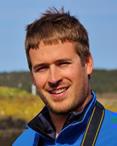
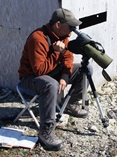
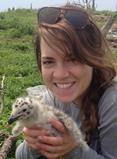
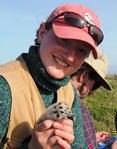
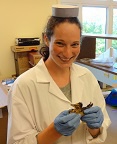
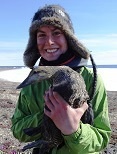
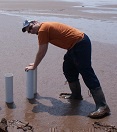
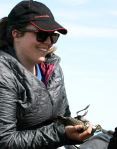
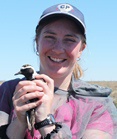
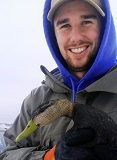
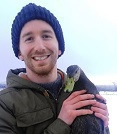
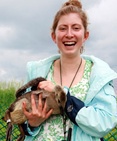
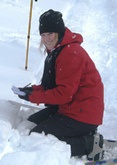
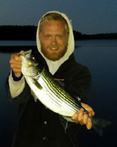
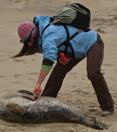


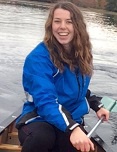
Mallory Lab - Acadia University
Students
Current students
Copyright 2011 Mark Mallory
33 Westwood Ave, Acadia University
Wolfville, NS B4P 2R6
33 Westwood Ave, Acadia University
Wolfville, NS B4P 2R6
Website Themes by CoffeeCup Software
Liam Peck
Liam started his M.Sc. at Acadia University investigating overwinter survival and breeding/wintering affinities of American Black Ducks (Anas rubripes) wintering in Nova Scotia, Canada. The project is sponsored by the Black Duck Joint Venture, and is a collaboration with Environment Canada. Greg Robertson is a co-supervisor on the project.
Liam started his M.Sc. at Acadia University investigating overwinter survival and breeding/wintering affinities of American Black Ducks (Anas rubripes) wintering in Nova Scotia, Canada. The project is sponsored by the Black Duck Joint Venture, and is a collaboration with Environment Canada. Greg Robertson is a co-supervisor on the project.
Christine McLauchlan
Christine is completing her M.Sc. at Acadia University, working in the Tantramar Region of Nova Scotia/New Brunswick. She is examining the temporal abundance and diversity of macroinvertebrates in brackish and freshwater ponds through the summer to compare across wetland types, and then comparing use of these wetlands by waterbirds in relation to food supplies. Nic McLellan (Ducks Unlimited Canada) and Al Hanson (Environment Canada) are collaborators in this project.
Christine is completing her M.Sc. at Acadia University, working in the Tantramar Region of Nova Scotia/New Brunswick. She is examining the temporal abundance and diversity of macroinvertebrates in brackish and freshwater ponds through the summer to compare across wetland types, and then comparing use of these wetlands by waterbirds in relation to food supplies. Nic McLellan (Ducks Unlimited Canada) and Al Hanson (Environment Canada) are collaborators in this project.
Danielle Fife
After completing her MSc in our lab, Dani just couldn't get enough of us, and decided to pursue a PhD, looking at patterns of stable isotopes, fatty acids and trace elements in multispecies seabird colonies in Labrador, Nova Scotia, and Namibia, Africa. Mucho cool. Danielle is based at Rhodes University in Grahamstown, South Africa, and is co-supervised by Nicole Richoux.
After completing her MSc in our lab, Dani just couldn't get enough of us, and decided to pursue a PhD, looking at patterns of stable isotopes, fatty acids and trace elements in multispecies seabird colonies in Labrador, Nova Scotia, and Namibia, Africa. Mucho cool. Danielle is based at Rhodes University in Grahamstown, South Africa, and is co-supervised by Nicole Richoux.
Jessica Stephens
Jessica comes to the lab from finishing her B.Sc. (honours) at Memorial University of Newfoundland. She is undertaking her M.Sc. by using VHF tracking and visual observation to assess marine habitat use by breeding Arctic (Sterna paradisaea) and Common Terns (S. hirundo) on Sable Island, looking for interspecific and seasonal differences in patterns and possible attraction to oil platforms, as part of the larger NSERC CRD tracking project led by Rob Ronconi and Phil Taylor with Encana. Phil is a co-supervisor on Jessica's work.
Jessica comes to the lab from finishing her B.Sc. (honours) at Memorial University of Newfoundland. She is undertaking her M.Sc. by using VHF tracking and visual observation to assess marine habitat use by breeding Arctic (Sterna paradisaea) and Common Terns (S. hirundo) on Sable Island, looking for interspecific and seasonal differences in patterns and possible attraction to oil platforms, as part of the larger NSERC CRD tracking project led by Rob Ronconi and Phil Taylor with Encana. Phil is a co-supervisor on Jessica's work.
Molly Tomlik (nee Simon)
Molly is a native Nova Scotian who completed her B.Sc. at St. Mary's University, but also studied at Sir Sandford Fleming in Ontario. She has a strong background and interest in coastal science. Her M.Sc. examines marine birds and habitat change along the Eastern Shore Islands of Nova Scotia. The project links to the long-term research in this area conducted by Randy Milton of the Nova Scotia Department of Natural Resources, a key collaborator in the project.
Molly is a native Nova Scotian who completed her B.Sc. at St. Mary's University, but also studied at Sir Sandford Fleming in Ontario. She has a strong background and interest in coastal science. Her M.Sc. examines marine birds and habitat change along the Eastern Shore Islands of Nova Scotia. The project links to the long-term research in this area conducted by Randy Milton of the Nova Scotia Department of Natural Resources, a key collaborator in the project.
Sarah Wong
Sarah is undertaking a post-doc at Acadia, using GIS techniques to identify at-sea "hotspots" for marine birds, derived from observational data from research, cruise and fishing vessels. Her focus will be on Arctic Canada, although she will use data from all three marine coastlines. Sarah's project is very timely, and will have application to many projects in Nunavut, including land use planning, environmental assessment, protected areas development, and conservation regulations related to fisheries and industrial development. Collaborators in her project include Carina Gjerdrum, Ken Morgan and Siu-Ling Han of Environment Canada.
Sarah is undertaking a post-doc at Acadia, using GIS techniques to identify at-sea "hotspots" for marine birds, derived from observational data from research, cruise and fishing vessels. Her focus will be on Arctic Canada, although she will use data from all three marine coastlines. Sarah's project is very timely, and will have application to many projects in Nunavut, including land use planning, environmental assessment, protected areas development, and conservation regulations related to fisheries and industrial development. Collaborators in her project include Carina Gjerdrum, Ken Morgan and Siu-Ling Han of Environment Canada.
Nathalie Leblanc
Nathalie's MSc follows her B.Sc. thesis on mitochondrial DNA in Purple Sandpipers (Calidris maritima). She is using data from across the species' range to link breeding populations to wintering populations in this declining species. Natural Resource personnel from Nova Scotia, New Brunswick, Newfoundland and Maine are collaborators in this project. Nathalie is co-supervised with Don Stewart.
Nathalie's MSc follows her B.Sc. thesis on mitochondrial DNA in Purple Sandpipers (Calidris maritima). She is using data from across the species' range to link breeding populations to wintering populations in this declining species. Natural Resource personnel from Nova Scotia, New Brunswick, Newfoundland and Maine are collaborators in this project. Nathalie is co-supervised with Don Stewart.
Matthew English
Matthew comes to the lab from his undergrad at Memorial University of Newfoundland, and he will be working on overwintering American Black Ducks (Anas rubripes) in the Maritimes. Matthew's focus will be on diet, food supplies, and assessing the relative influence of urban vs. natural food supplies on condition and possibly survival. Matthew is co-supervised by Greg Robertson at Environment Canada, St. John's, NL, and is supported by Environment Canada and the Black Duck Joint Venture.
Matthew comes to the lab from his undergrad at Memorial University of Newfoundland, and he will be working on overwintering American Black Ducks (Anas rubripes) in the Maritimes. Matthew's focus will be on diet, food supplies, and assessing the relative influence of urban vs. natural food supplies on condition and possibly survival. Matthew is co-supervised by Greg Robertson at Environment Canada, St. John's, NL, and is supported by Environment Canada and the Black Duck Joint Venture.
Travis White
Travis joins the Mallory Lab officially in 2013, after completing his
MSc at Acadia. Travis's PhD will use existing and new tracking data from marine birds in the Canadian Arctic to look at the predictability of spatial and temporal hotspots in the marine environment, how those compare to hotspots derived from at-sea data or from colony-based GPS trackers, and how this information can provide important insights for conservation during marine spatial planning in the Arctic. Travis is co-supervised with Lenore Fahrig at Carleton University (where Travis is located) and Grant Gilchrist at Environment Canada, Ottawa, and is supported by Environment Canada and the World Wildlife Fund Canada.
Travis joins the Mallory Lab officially in 2013, after completing his
MSc at Acadia. Travis's PhD will use existing and new tracking data from marine birds in the Canadian Arctic to look at the predictability of spatial and temporal hotspots in the marine environment, how those compare to hotspots derived from at-sea data or from colony-based GPS trackers, and how this information can provide important insights for conservation during marine spatial planning in the Arctic. Travis is co-supervised with Lenore Fahrig at Carleton University (where Travis is located) and Grant Gilchrist at Environment Canada, Ottawa, and is supported by Environment Canada and the World Wildlife Fund Canada.
Paul Woodard
Paul has been working with the Canadian Wildlife Service in Yellowknife, NT for several years, working on waterfowl and shorebirds. In 2012, he had an epiphany that the future really lies with seabirds, and decided to start his M.Sc. He is studying the breeding ecology of high Arctic Black-legged Kittiwakes (Rissa tridactyla) at Prince Leopold Island, to better understand the influence of sea-ice and snow on their reproductive success. Paul's project relies heavily on collaboration and support from Environment Canada, and links to long-term monitoring data provided by Tony Gaston.
Paul has been working with the Canadian Wildlife Service in Yellowknife, NT for several years, working on waterfowl and shorebirds. In 2012, he had an epiphany that the future really lies with seabirds, and decided to start his M.Sc. He is studying the breeding ecology of high Arctic Black-legged Kittiwakes (Rissa tridactyla) at Prince Leopold Island, to better understand the influence of sea-ice and snow on their reproductive success. Paul's project relies heavily on collaboration and support from Environment Canada, and links to long-term monitoring data provided by Tony Gaston.
Amy Russell
Amy worked with the lab in the summer of 2014 on a variety of projects, as part of her co-op placement through Acadia. Her principle tasks involved dissections of waterfowl that were collected on Ontario in lakes differentially affected by acid rain, as a prelude to analyses on trace element uptake in young birds. However, she was also a key member of the team implanting satellite transmitters in common eiders in the Eastern Shore Islands, sampling experimental wetlands at the Beaubassin Research Station, and attaching geolocators to willets at Country Island. Amy will be completing her BSc at Acadia in the 2014/2015 school year.
Amy worked with the lab in the summer of 2014 on a variety of projects, as part of her co-op placement through Acadia. Her principle tasks involved dissections of waterfowl that were collected on Ontario in lakes differentially affected by acid rain, as a prelude to analyses on trace element uptake in young birds. However, she was also a key member of the team implanting satellite transmitters in common eiders in the Eastern Shore Islands, sampling experimental wetlands at the Beaubassin Research Station, and attaching geolocators to willets at Country Island. Amy will be completing her BSc at Acadia in the 2014/2015 school year.
Isabeau Pratte
Isabeau is the newest MSc student to the lab, coming from Université du Québec à Rimouski. She is a climber, has a cool french accent, and previously worked with the field team at Bylot Island in Nunavut. Starting in 2013, she is working in the Arctic, looking at hormonal differences between birds nesting at different locations in colonies. Her field work will be conducted at Nasaruvaalik Island, as well as the Gannet Islands of coastal Labrador.
Isabeau is the newest MSc student to the lab, coming from Université du Québec à Rimouski. She is a climber, has a cool french accent, and previously worked with the field team at Bylot Island in Nunavut. Starting in 2013, she is working in the Arctic, looking at hormonal differences between birds nesting at different locations in colonies. Her field work will be conducted at Nasaruvaalik Island, as well as the Gannet Islands of coastal Labrador.
Adam Godfrey
Adam finished a lovely BSc thesis on salt marsh chemistry with Nelson O'Driscoll, and is starting a MSc based in the Mallory Lab, but co-supervised by Mark, Ian Spooner and Nelson O'Driscoll. Adam will be looking at the effects of different land uses (notably logging) on riparian and aquatic areas in western Nova Scotia, particularly the effects of decay and release of trace elements to streams and rivers, and the possible contribution of non-essential elements to local food chains.
Adam finished a lovely BSc thesis on salt marsh chemistry with Nelson O'Driscoll, and is starting a MSc based in the Mallory Lab, but co-supervised by Mark, Ian Spooner and Nelson O'Driscoll. Adam will be looking at the effects of different land uses (notably logging) on riparian and aquatic areas in western Nova Scotia, particularly the effects of decay and release of trace elements to streams and rivers, and the possible contribution of non-essential elements to local food chains.
Karissa Reischke
Karissa joined the lab in 2014, and is completing her MScAG in applied geomatics here at Acadia. Her project examines changes in land cover on northern Coats Island, Nunavut, over the past ~ 2 decades, as it relates to increasing white goose populations in the Arctic. She is co-supervised by David Colville at Nova Scotia Community College, and her project is tied to that of Paul Smith, research scientist with Environment Canada, who runs the field station at Coats Island.
Karissa joined the lab in 2014, and is completing her MScAG in applied geomatics here at Acadia. Her project examines changes in land cover on northern Coats Island, Nunavut, over the past ~ 2 decades, as it relates to increasing white goose populations in the Arctic. She is co-supervised by David Colville at Nova Scotia Community College, and her project is tied to that of Paul Smith, research scientist with Environment Canada, who runs the field station at Coats Island.
Christine Anderson
Christine's M.Sc. uses satellite telemetry to track Herring Gulls from their breeding colony on Southampton Island, and she will be examining local habitat use as well as year-round movements. She will be comparing this to movements of gulls breeding in the Great Lakes and Atlantic Canada. She is co-supervised by Grant Gilchrist, and is funded through a MITACs grant related to the Baffinland Iron Mine in Nunavut. Other gull researchers like Rob Ronconi will be closely involved in this project.
Christine's M.Sc. uses satellite telemetry to track Herring Gulls from their breeding colony on Southampton Island, and she will be examining local habitat use as well as year-round movements. She will be comparing this to movements of gulls breeding in the Great Lakes and Atlantic Canada. She is co-supervised by Grant Gilchrist, and is funded through a MITACs grant related to the Baffinland Iron Mine in Nunavut. Other gull researchers like Rob Ronconi will be closely involved in this project.
Amanda Loder
After completing her BSc thesis on metals in wetland biota, Amanda has started her MSc on wetlands in Nova Scotia and New Brunswick. Specifically, she is examining how rapidly constructed wetlands decline in productivity, how this compares to natural wetland production dynamics, and what factors might contribute to this. She is co-supervised by Ian Spooner at Acadia, and her project is supported by Ducks Unlimited Canada.
After completing her BSc thesis on metals in wetland biota, Amanda has started her MSc on wetlands in Nova Scotia and New Brunswick. Specifically, she is examining how rapidly constructed wetlands decline in productivity, how this compares to natural wetland production dynamics, and what factors might contribute to this. She is co-supervised by Ian Spooner at Acadia, and her project is supported by Ducks Unlimited Canada.
Savannah Mahoney
Savannah is undertaking her BSc (honours) thesis at Acadia, but has arranged her collaboration on a research project on tropical seabirds at Christmas Island with Janos Hennicke from Germany. She'll be looking at foraging routes and distances of species from the island. Savannah is co-supervised by Dave Shutler.
Savannah is undertaking her BSc (honours) thesis at Acadia, but has arranged her collaboration on a research project on tropical seabirds at Christmas Island with Janos Hennicke from Germany. She'll be looking at foraging routes and distances of species from the island. Savannah is co-supervised by Dave Shutler.
Bernice Sepers
Bernice is a visiting student scholar in the Mallory Lab, doing her MSc at the University of Utrecht in Holland. She is working in Nova Scotia with the Department of Natural Resources, looking at tracking of furbearers (notably lynx) in Cape Breton Island in relation to habitat. Lead supervisors are Randy Milton and Mike O'Brien ... but she comes back from the field to our lab for intellectual stimulation :)
Bernice is a visiting student scholar in the Mallory Lab, doing her MSc at the University of Utrecht in Holland. She is working in Nova Scotia with the Department of Natural Resources, looking at tracking of furbearers (notably lynx) in Cape Breton Island in relation to habitat. Lead supervisors are Randy Milton and Mike O'Brien ... but she comes back from the field to our lab for intellectual stimulation :)
Max Turner
Max is doing his BSc in the lab, looking at seasonal water chemistry ponds in experimental wetlands constructed at the Beaubassin Research Station at Aulac, NB, and he'll be assisting Amanda Loder with her M.Sc. research. Max is co-supervised by Ian Spooner.
Max is doing his BSc in the lab, looking at seasonal water chemistry ponds in experimental wetlands constructed at the Beaubassin Research Station at Aulac, NB, and he'll be assisting Amanda Loder with her M.Sc. research. Max is co-supervised by Ian Spooner.
George Nau
George did his BSc at Acadia, and has returned to do his MSc. He'll be looking at the process of biotransport, in this case where anadromous fish move marine-derived nutrients from the ocean up to freshwater wetlands and ponds, which they deposit when the breed (or die). This work is a follow-up to Sam Andrews thesis on effectiveness of fishways. George is co-supervised by Mike Stokesbury, his project will have major input from Ian Spooner, and it is intimately tied to and based upon financial and logistic support from Ducks Unlimited Canada, through Nic McLellan.
George did his BSc at Acadia, and has returned to do his MSc. He'll be looking at the process of biotransport, in this case where anadromous fish move marine-derived nutrients from the ocean up to freshwater wetlands and ponds, which they deposit when the breed (or die). This work is a follow-up to Sam Andrews thesis on effectiveness of fishways. George is co-supervised by Mike Stokesbury, his project will have major input from Ian Spooner, and it is intimately tied to and based upon financial and logistic support from Ducks Unlimited Canada, through Nic McLellan.
